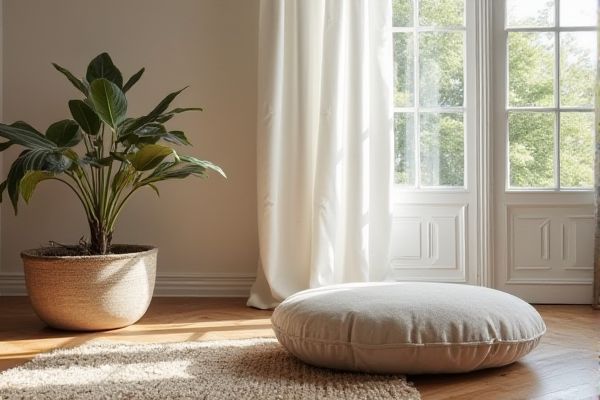
Choosing between a floor cushion and an ottoman depends on your space, style preferences, and functional needs, as floor cushions offer casual, versatile seating while ottomans provide structured support and potential storage. Explore this article to discover which option best complements your living area and enhances your comfort.
Table of Comparison
| Feature | Floor Cushion | Ottoman |
|---|---|---|
| Primary Use | Comfortable low seating or ground-level lounging | Footrest, extra seating, and storage option |
| Structure | Soft, plush, flat cushion without frame | Upholstered, often with hard frame and legs |
| Portability | Lightweight and easy to move | Usually heavier and less portable |
| Storage | No storage capacity | Often includes internal storage compartment |
| Height | Low to the ground, typically 2-6 inches | Higher, usually 12-20 inches |
| Material | Fabric or foam-filled textile | Leather, fabric, or synthetic upholstery |
| Design Versatility | Casual and flexible in style | Varied styles from classic to modern |
| Durability | Less durable, depends on fabric quality | More durable due to frame construction |
| Price Range | Generally lower cost ($20-$80) | Higher price range ($50-$300+) |
Introduction to Floor Cushions and Ottomans
Floor cushions offer versatile, lightweight seating often used for casual lounging or extra comfort on hard floors. Ottomans serve as multifunctional furniture pieces combining storage, seating, and footrest functions with sturdy construction. Your choice depends on space needs and style preferences, balancing portability with functionality.
Design and Aesthetic Appeal
Floor cushions boast a casual, versatile design that complements bohemian, minimalist, and modern interiors, often featuring vibrant patterns and soft textures for added comfort. Ottomans present a structured, polished aesthetic with options in leather, velvet, or fabric upholstery, making them suitable for classic, contemporary, and transitional spaces. Both pieces serve as functional accents, but floor cushions introduce a relaxed vibe while ottomans enhance sophistication and visual order.
Comfort and Ergonomics
Floor cushions provide soft, flexible seating that adapts easily to your body, promoting relaxed posture and comfortable lounging on the ground. Ottomans offer firmer support with structured padding and elevated height, making them ideal for maintaining ergonomic alignment when used as footrests or extra seating. Your choice depends on whether you prioritize casual, sink-in comfort or stable, supportive ergonomics for extended use.
Space-Saving Qualities
Floor cushions offer superior space-saving qualities due to their lightweight, stackable design and easy portability, making them ideal for small living areas or multifunctional spaces. Ottomans, while providing additional storage and seating, typically require more floor space and are less flexible in arrangement. Choosing floor cushions maximizes room versatility without sacrificing comfort or style.
Versatility in Usage
Floor cushions provide versatile seating options for casual, flexible spaces, easily moved or stacked to create extra comfort or lounge areas. Ottomans function both as footrests and storage units, doubling as coffee tables or additional seating with a more structured form. Your choice depends on whether you value lightweight adaptability or multifunctional furniture with dedicated storage features.
Material and Durability Comparison
Floor cushions are often crafted from soft fabrics like cotton or velvet with polyester filling, offering lightweight comfort but moderate durability suitable for casual use. Ottomans typically feature sturdier materials such as hardwood frames and dense foam padding, sometimes upholstered in leather or durable synthetic fabrics, providing greater longevity and structural support. Your choice depends on whether you prioritize the plush, flexible feel of a floor cushion or the robust, multi-functional durability of an ottoman.
Storage Features: Pros and Cons
Floor cushions offer limited storage options, primarily designed for comfort rather than functionality, making them less ideal for organizing small items. Ottomans typically feature built-in storage compartments, providing a dual-purpose solution that maximizes space efficiency, ideal for keeping blankets, magazines, or remote controls. However, ottomans can be bulkier and less flexible in placement compared to lightweight, portable floor cushions.
Price Range and Affordability
Floor cushions generally offer a more budget-friendly price range, typically starting as low as $20 to $50, making them an affordable seating option for casual or temporary use. Ottomans, priced between $80 and $300 or more, often feature sturdier construction and multifunctional designs that justify their higher cost. For cost-conscious shoppers, floor cushions provide a simple, versatile option, while ottomans represent an investment in durability and style.
Best Room Applications
Floor cushions excel in casual living spaces and playrooms, providing flexible, lightweight seating that can be easily stored or moved. Ottomans work best in formal living rooms and bedrooms, serving dual functions as footrests and storage units, complementing sofas and armchairs. For small apartments, floor cushions optimize space without bulk, while ottomans add style and functionality where space permits.
Which is Right for You: Floor Cushion or Ottoman?
Choosing between a floor cushion and an ottoman depends on your space, style, and functionality needs. Floor cushions offer casual, flexible seating perfect for small or informal areas, while ottomans provide sturdy support with extra storage options and can double as footrests or coffee tables. Consider your living space size, decor preferences, and whether you need additional storage when deciding which option suits you best.
 homyna.com
homyna.com